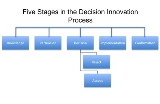
Diffusion of innovations
Overview
Idea
In the most narrow sense, an idea is just whatever is before the mind when one thinks. Very often, ideas are construed as representational images; i.e. images of some object. In other contexts, ideas are taken to be concepts, although abstract concepts do not necessarily appear as images...
s and technology
Technology
Technology is the making, usage, and knowledge of tools, machines, techniques, crafts, systems or methods of organization in order to solve a problem or perform a specific function. It can also refer to the collection of such tools, machinery, and procedures. The word technology comes ;...
spread through culture
Culture
Culture is a term that has many different inter-related meanings. For example, in 1952, Alfred Kroeber and Clyde Kluckhohn compiled a list of 164 definitions of "culture" in Culture: A Critical Review of Concepts and Definitions...
s. Everett Rogers
Everett Rogers
Everett M. Rogers was a communication scholar, sociologist, writer, and teacher. He is best known for originating the diffusion of innovations theory and for introducing the term early adopter....
, a professor of rural sociology, popularized the theory in his 1962 book Diffusion of Innovations
Diffusion of innovations
Diffusion of Innovations is a theory that seeks to explain how, why, and at what rate new ideas and technology spread through cultures. Everett Rogers, a professor of rural sociology, popularized the theory in his 1962 book Diffusion of Innovations...
. He said diffusion is the process by which an innovation is communicated through certain channels over time among the members of a social system. The origins of the diffusion of innovations theory are varied and span multiple disciplines.
The concept was first studied by the French sociologist Gabriel Tarde
Gabriel Tarde
Jean-Gabriel De Tarde or Gabriel Tarde in short French sociologist, criminologist and social psychologist who conceived sociology as based on small psychological interactions among individuals , the fundamental forces being imitation and innovation.- Theory :Among the concepts...
(1890) and by German and Austrian anthropologists such as Friedrich Ratzel
Friedrich Ratzel
Friedrich Ratzel was a German geographer and ethnographer, notable for first using the term Lebensraum in the sense that the National Socialists later would.-Life:...
and Leo Frobenius
Leo Frobenius
Leo Viktor Frobenius was an ethnologist and archaeologist and a major figure in German ethnography.-Life:He was born in Berlin as the son of a Prussian officer and died in Biganzolo, Lago Maggiore, Piedmont, Italy...
.
Unanswered Questions

